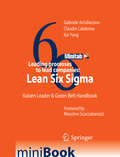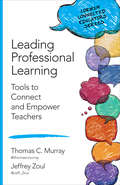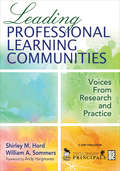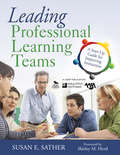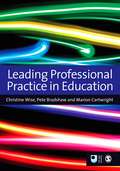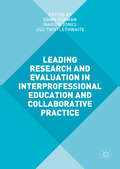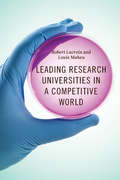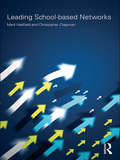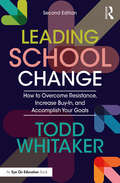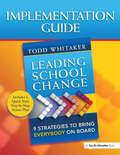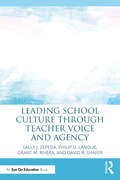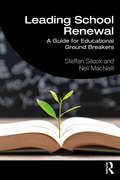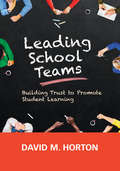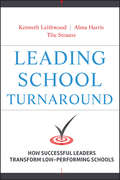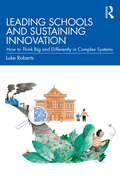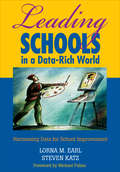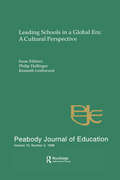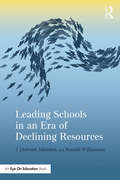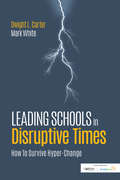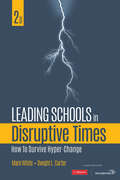- Table View
- List View
Leading processes to lead companies: Kaizen Leader & Green Belt Handbook
by Claudio Calabrese Gabriele Arcidiacono Kai YangThis Minibook is a brief guide for Green Belt during a Lean Six Sigma project management or for Kaizen Leader during a process improvement activity. Through both its theoretical concepts and practical examples it is a pocket book for a quick consultancy. Authors idea comes from companies needs in order to analyze information useful to know in depth different kind of processes. The set of Six Sigma tools are explained through Minitab 16, the last release of the most widely used statistical software.
Leading Professional Learning: Tools to Connect and Empower Teachers (Corwin Connected Educators Series)
by Thomas C. Murray Jeffrey J. ZoulExpert strategies for personalized, 21st Century professional learning! Empower teachers to take ownership of their own professional learning. Recognized EdTech leaders Murray and Zoul guide you step-by-step through the process. Confidently learn to build a values-driven school culture, personalized professional roadmaps, and a collaboration-minded staff. You’ll find concrete examples, leadership profiles, and a wealth of resources to help administrators and teachers: Take ownership of their professional growth Design meaningful learning opportunities Collaborate and learn using technology, blogs, and social media Model and support professional learning for others Transform teacher learning and see your student achievement soar!
Leading Professional Learning: Tools to Connect and Empower Teachers (Corwin Connected Educators Series)
by Thomas C. Murray Jeffrey J. ZoulExpert strategies for personalized, 21st Century professional learning! Empower teachers to take ownership of their own professional learning. Recognized EdTech leaders Murray and Zoul guide you step-by-step through the process. Confidently learn to build a values-driven school culture, personalized professional roadmaps, and a collaboration-minded staff. You’ll find concrete examples, leadership profiles, and a wealth of resources to help administrators and teachers: Take ownership of their professional growth Design meaningful learning opportunities Collaborate and learn using technology, blogs, and social media Model and support professional learning for others Transform teacher learning and see your student achievement soar!
Leading Professional Learning Communities: Voices From Research and Practice
by Shirley M. Hord William A. SommersImagine all professionals in all schools engaged in continuous professional learning! Education experts Shirley M. Hord and William A. Sommers explore the school-based learning opportunities offered to school professionals and the principal's critical role in the creation, development, and support of an effective professional learning community (PLC). This book provides school leaders with readily accessible information to guide them in initiating and developing a PLC that supports teachers and students. Using field-tested examples, the text illustrates how this research-based school improvement model can help educators: Increase leadership capacity Embed professional development into daily work Create a positive school culture Develop accountability Boost student achievement
Leading Professional Learning Teams: A Start-Up Guide for Improving Instruction
by Dr Susan E. SatherDeveloped by Education Northwest (formerly NWREL), this guide offers a data-driven model for implementing professional learning teams to strengthen teacher collaboration, improve instruction, and increase student achievement.
Leading Professional Practice in Education (Published in association with The Open University)
by Dr Christine Wise Pete Bradshaw Marion CartwrightThis volume provides an overview of key contemporary themes in educational leadership. It focuses on developing professional capacity, organisation improvement and the implementation of change, looking at theoretical frameworks and concepts, recent research studies and case examples of effective practice. The book covers: - leading learning and learner leadership - change processes and distributed leadership - leading professional development for educational contexts. Designed to encourage critical analysis and debate, this volume will be a useful resource for postgraduate and professional development courses in educational leadership and for practitioners. It is a companion to Educational Leadership: Context, Strategy and Collaboration, also published by Sage.
Leading Research and Evaluation in Interprofessional Education and Collaborative Practice
by Dawn Forman Marion Jones Jill ThistlethwaiteExpanding upon LeadershipDevelopment for Interprofessional Education and Collaborative Practice and Leadership and Collaboration, the thirdinstallment to this original and innovative collection of books considers avariety of research models and theories. Emphasizing research and evaluation inleadership aspects, Leading Research andEvaluation in Interprofessional Education and Collaborative Practice showcasesexamples from around the globe in various multicultural contexts. Crucial foracademics and researchers in this field, the book includes studies ontraditionally under-represented countries and aims to prompt new ideas forfuture research and policy structures in Interprofessional education andpractice.
Leading research universities in a competitive world
by Robert LacroixAlthough research universities represent only fifteen to twenty per cent of national university systems worldwide, they provide the bulk of fundamental research and doctoral training. Written by two veteran university administrators, Leading Research Universities in a Competitive World focuses on the international ranking systems’ uneven distribution of these institutions in industrialized countries, and the organizational factors affecting their efficacy, prestige, and performance. Robert Lacroix and Louis Maheu argue that research universities, despite being embedded within academia’s mindset and rules, have to master market influences and relationships in order to produce new knowledge and attract the rare talent and limited financial assets required for successful research and education activities. Comparing the configuration of higher education systems in the US, UK, France, and Canada, the authors outline the ways in which research universities, which need public funding and have to engage diverse forms of state regulation, may possess sufficient autonomy to behave as independent actors. They demonstrate that reaching an equilibrium between autonomy and state regulation, though challenging, is an essential element in the success of high performing research universities. Leading Research Universities in a Competitive World illuminates the operation of these institutions through substantive quantitative and qualitative datasets to address the fundamental question of why universities perform differently.
Leading Research Universities in a Competitive World: Autonomous Institutions In A Competitive Academic World
by Robert Lacroix Louis MaheuAlthough research universities represent only fifteen to twenty per cent of national university systems worldwide, they provide the bulk of fundamental research and doctoral training. Written by two veteran university administrators, Leading Research Universities in a Competitive World focuses on the international ranking systems’ uneven distribution of these institutions in industrialized countries, and the organizational factors affecting their efficacy, prestige, and performance. Robert Lacroix and Louis Maheu argue that research universities, despite being embedded within academia’s mindset and rules, have to master market influences and relationships in order to produce new knowledge and attract the rare talent and limited financial assets required for successful research and education activities. Comparing the configuration of higher education systems in the US, UK, France, and Canada, the authors outline the ways in which research universities, which need public funding and have to engage diverse forms of state regulation, may possess sufficient autonomy to behave as independent actors. They demonstrate that reaching an equilibrium between autonomy and state regulation, though challenging, is an essential element in the success of high performing research universities. Leading Research Universities in a Competitive World illuminates the operation of these institutions through substantive quantitative and qualitative datasets to address the fundamental question of why universities perform differently.
Leading School-based Networks
by Mark Hadfield Christopher ChapmanThe persistent challenge of achieving excellence and equity within education systems has renewed interest in generating context-specific solutions through localised school networks. But how can successful school networks be developed? Based around the lifecycle of a network, this book traces the development of a network from its initial inception, exploring the ways in which it can be sustained and remain capable of meeting the future challenges faced by schools and their communities. The book explores a series of important issues facing school leaders, including: the benefits of investing time and energy in networks with other schools and communities the particular problems faced by schools and the education system which are best tackled by network-based solutions the advantages for schools and communities of engaging with collaborative reform agenda the ways in which networks can be managed, and the differences between leading a school or a team and a network the elements which make an effective network. The book draws on UK and international research to discuss the development and leadership of networks and to outline a number of tried-and-tested leadership approaches. In addition, the authors draw on their own experience and research to provide accounts of real networks to expose the realities of networking. Each chapter tackles a key leadership issue and ends with a series of tools to support those leading and facilitating networks tackle these in practice. This book will be of interest to practising school leaders, network co-ordinators, postgraduate students and those researching educational leadership and school improvement.
Leading School Change: How to Overcome Resistance, Increase Buy-In, and Accomplish Your Goals
by Todd WhitakerBeing a cheerleader for innovation or change is great. Implementing specific strategies to increase the likelihood of success is essential. In this key book from bestselling author and speaker Todd Whitaker, you’ll discover clear ways to lead and manage school change by setting realistic goals, planning your approach, and tracking your progress. You’ll also find out how to work effectively with others, overcome resistance, and gain widespread acceptance. Whether you are a district leader, building leader, instructional coach, or teacher-leader, you’ll come away from this book with all the tools and inspiration you need to make a positive, immediate, results-oriented change with the support of your staff. Bonus: This enhanced second edition includes a special Action Plan and Implementation Guide. The Action Plan will help you apply the ideas, step by step, to your own situation. The Implementation Guide can be used for independent reflection or as a study guide with book groups or professional learning communities.
Leading School Change: 9 Strategies to Bring Everybody on Board (Study Guide)
by Todd WhitakerThis two-part Implementation Guide will help to deepen your understanding and sharpen your ability to implement each of the strategies discussed in Leading School Change: Nine Strategies to Bring Everybody on Board. Part One offers discussion questions and activities which focus on each of the nine strategies. They can be completed by an educator working individually or addressed collaboratively and interactively by a group or leadership team from a school, district, or organization. This guide will greatly enhance your group’s ability to implement any change you would like to make in your organization. Part Two consists of a Quick Start Step-By-Step Action Plan. It is for individuals and leadership groups to use once they have a full understanding of the nine strategies and are ready to start implementing the changes they need to improve their organizations.
Leading School Culture through Teacher Voice and Agency
by Sally J. Zepeda Philip D. Lanoue Grant M. Rivera David R. ShaferLeading School Culture through Teacher Voice and Agency helps school leaders uncover, understand, and build the skill set to engage teachers in the work of school culture as they navigate the changes needed to improve the achievement for all students. This book presents a Framework for School Culture that explores how school culture, when acted upon through teacher voice and agency, is an untapped resource that can move schools forward. By supporting teacher voice and agency, the school and its teachers and leaders move toward taking collective responsibility for sustaining a culture of improvement that is stronger and more responsive. This research-grounded book is rich in practical tools to help leaders work with teachers, ensuring all the educators in a school are taking ownership over their own learning and developing the skills to reshape school culture to ensure students, teachers, and community members thrive.
Leading School Renewal: A Guide for Educational Ground Breakers
by Steffan Silcox Neil MacNeillLeading School Renewal explores how school principal leadership behaviour impacts on school change endeavours, and in particular pedagogic renewal, which is a form of educational improvement that is primarily concerned with the growing of the knowledge, skills and beliefs of education in a manner that optimises students’ life options. The authors identify attributes of principals who have engaged in school renewal and examine the influences on their leadership behaviours and disposition towards renewing their schools while also acknowledging the influence of site-specific contextual variables. The authors propose that certain leadership behaviours exhibited by school principals are integral with renewing a school’s pedagogic focus. They argue renewal is a preferred form of sustainable educational change because it relates to deep-seated cultural changes in approaches to pedagogy, curriculum and school structures. Whilst also maintaining that leadership is at the heart of school improvement and principal leadership practices which are based on a clear sense of purpose, values and beliefs about learning and teaching can transform a school into a learning organisation. Including a foreword by Professor John Hattie, this book is appropriate for all school leaders and educators who want to learn more about school leadership behaviours and highly effective school change.
Leading School Teams: Building Trust to Promote Student Learning
by Dr David M. HortonThe busy administrator’s guide to creating strong teams, changing culture, and improving performance Research shows that “teacher collective efficacy” can increase student learning more than any other strategy. In fact, using powerhouse teams can achieve four years of student growth in a single calendar year. Horton’s practical guide offers: Short activities that require little to no preparation that you can use to deepen conversation at your very next meeting Step-by-step tools to help your team move from identifying its biggest challenges to choosing and implementing successful reforms Strategies to enhance teamwork, trust, and collaboration so your team becomes as effective as possible
Leading School Teams: Building Trust to Promote Student Learning
by Dr David M. HortonThe busy administrator’s guide to creating strong teams, changing culture, and improving performance Research shows that “teacher collective efficacy” can increase student learning more than any other strategy. In fact, using powerhouse teams can achieve four years of student growth in a single calendar year. Horton’s practical guide offers: Short activities that require little to no preparation that you can use to deepen conversation at your very next meeting Step-by-step tools to help your team move from identifying its biggest challenges to choosing and implementing successful reforms Strategies to enhance teamwork, trust, and collaboration so your team becomes as effective as possible
Leading School Turnaround
by Alma Harris Tiiu Strauss Kenneth LeithwoodPraise for Leading School Turnaround"Going beyond their previous considerable work on the study of leadership, Kenneth Leithwood, Alma Harris, and Tiiu Strauss now get up-close and detailed. They use their powerful framework for how school leaders influence student learning, but this time they get inside the 'how.' Practical, powerful, interesting, and insightful-an indispensible resource for turnaround leaders."-Michael Fullan, professor emeritus, Ontario Institute for Studies in Education at the University of Toronto"The problem of bringing about change in those schools where it is needed most remains one of the most intractable challenges in school leadership. This book is written by international scholars who understand the complexities of this challenge. Unlike other volumes based on a single person's experience or a reading of the literature, these authors offer useful specific insights based on data about what leaders in schools that accomplish fundamental change actually do."-Philip Hallinger, Chair Professor of Leadership and Change, Hong Kong Institute of Education
Leading Schools and Sustaining Innovation: How to Think Big and Differently in Complex Systems
by Luke RobertsHow can school leaders analyse and meaningfully engage in the complex process of change? Offering an innovative introduction to the challenges of school leadership from the perspective of systems, this essential staff-room companion shows why school leaders now need to think and engage as system leaders more than ever before. Luke Roberts explores what types of systems can be most effectively implemented and provides cutting-edge ideas on what school leaders can do to embed and genuinely sustain innovation. He also presents a framework based on understanding different stakeholder views and shows how to facilitate process to gain new perspectives and enthuse the whole school community. This accessible resource focuses on the application, to enable readers to use their understanding of creativity and innovation to transform systems. He provides examples from research successfully conducted in schools as well as the lived experiences of working to change schools. He also helpfully provides a simple route to engaging with system thinking, asking what this means for the reader and the specific challenges they face. Leading Schools and Sustaining Innovation will appeal to educationalists across the whole educational sector, including head teachers, policy leaders as well as staff working towards and passionate about school improvement and transformation.
Leading Schools in a Data-Rich World: Harnessing Data for School Improvement
by Lorna M. Earl Steven KatzTurn skepticism about data into knowledge for true educational reform! More versatile than mere number crunching and statistics, data can be an effective tool—or even a powerful catalyst—for change within a school. Lorna M. Earl and Steven Katz show educators how to become comfortable with data, and provide valuable tools that school leaders and school improvement teams can use in their work, including: Vignettes to support group discussion Activities to give readers a chance to practice ideas and concepts Task sheets Short case studies that show how the full process works
Leading Schools in a Global Era: A Cultural Perspective: A Special Issue of the Peabody Journal of Education
by Philip Hallinger Kenneth LeithwoodThis special issue looks at the constantly changing face of education in the world today. Topics covered include educational values, cross-cultural studies, leadership, social impacts, and the role of technology in education.
Leading Schools in an Era of Declining Resources
by J. Howard Johnston Ronald WilliamsonEvery day, school leaders across the country are having to make difficult decisions in this economically demanding environment. If you are a leader facing this challenge in your own school or district, this is the book you need! Experienced educators Johnston and Williamson offer practical advice to help you tackle a variety of tough issues, including staff reductions and program termination. You’ll learn how to… Wring every bit of performance out of every available dollar Plan innovations and evaluate their effectiveness Engage faculty and the community Streamline operations using digital technology and social media Use four strategies—reduce, refine, restructure, and regenerate—to make your school more efficient and effective Each chapter is filled with tips, tools, exercises, and mini-cases to help you apply these ideas to your own situation. You’ll gain the confidence and knowledge to manage your budget while ensuring your students get the full benefit of a quality education.
Leading Schools in Disruptive Times: How To Survive Hyper-Change
by Dwight L. Carter Mark E. WhiteA school leadership model for surviving hyper-change From social media to evolving safety issues to constant school reform, today&’s school leaders face unprecedented disruption. How can educators prepare students for a globalized world when many institutions are not ready for the constantly changing 21st century? With an eye on the past and a vision for the future, Carter and White draw the blueprint for adapting schools to ever-changing times. • A comprehensive history of disruption in American schools as a lens for understanding accelerated change • Practical exercises and real-life examples for reshaping education in the 21st century • A grounded examination of radical disruptions schools will face in the years to come
Leading Schools in Disruptive Times: How To Survive Hyper-Change
by Dwight L. Carter Mark E. WhiteA school leadership model for surviving hyper-change From social media to evolving safety issues to constant school reform, today’s school leaders face unprecedented disruption. How can educators prepare students for a globalized world when many institutions are not ready for the constantly changing 21st century? With an eye on the past and a vision for the future, Carter and White draw the blueprint for adapting schools to ever-changing times. • A comprehensive history of disruption in American schools as a lens for understanding accelerated change • Practical exercises and real-life examples for reshaping education in the 21st century • A grounded examination of radical disruptions schools will face in the years to come
Leading Schools in Disruptive Times: How to Survive Hyper-Change
by Mark E. White Dwight L. CarterFrom surviving to thriving during constant disruption The updated edition of this handbook couldn’t have come at a better time. Focusing on lessons learned from the disruptions of 2020, including the COVID school closures and the renewed pursuit of social justice, the authors show school leaders how to prepare for and respond to disruptions that are leading to a "new normal." Educators are racing to stay ahead of pandemic-scale disruptions and need a blueprint for transformation. This book will walk you through the decision-making process so you’ll be able to transform as a leader to confront the issues you’ll face in the 2020s. Features include: • Practical strategies for identifying and responding to disruptions • An overview of the CAT framework: coping, adjusting, transforming • Real-life stories from exceptional educational leaders • Tips on guiding teachers, staff, and students through the many lessons learned during the pandemic • Activities, scenarios, and practical actions to lead through complex topics that include remote learning, social justice issues, education reforms, generational differences, and social media issues The pandemic has been the biggest disruption in school history, and this will be a decade of monumental change for schools. Your stakeholders will look to you to guide them—and this book gives you the tools you need to have the mindset and practical steps to be successful in an ever-changing world.
Leading Schools in Disruptive Times: How to Survive Hyper-Change
by Mark E. White Dwight L. CarterFrom surviving to thriving during constant disruption The updated edition of this handbook couldn’t have come at a better time. Focusing on lessons learned from the disruptions of 2020, including the COVID school closures and the renewed pursuit of social justice, the authors show school leaders how to prepare for and respond to disruptions that are leading to a "new normal." Educators are racing to stay ahead of pandemic-scale disruptions and need a blueprint for transformation. This book will walk you through the decision-making process so you’ll be able to transform as a leader to confront the issues you’ll face in the 2020s. Features include: • Practical strategies for identifying and responding to disruptions • An overview of the CAT framework: coping, adjusting, transforming • Real-life stories from exceptional educational leaders • Tips on guiding teachers, staff, and students through the many lessons learned during the pandemic • Activities, scenarios, and practical actions to lead through complex topics that include remote learning, social justice issues, education reforms, generational differences, and social media issues The pandemic has been the biggest disruption in school history, and this will be a decade of monumental change for schools. Your stakeholders will look to you to guide them—and this book gives you the tools you need to have the mindset and practical steps to be successful in an ever-changing world.
